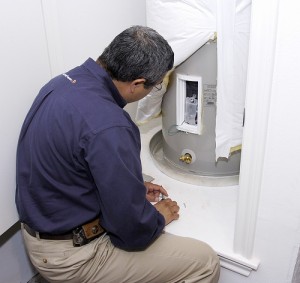Energy Efficiency Jobs
Energy auditors help uncover the secrets of energy efficiency and money saving techniques to conserve energy.
Energy auditors help uncover the secrets of energy efficiency and money saving techniques to conserve energy.
An energy auditor’s main focus is to identify and prioritize energy saving measures. These green job holders often travel to homes or commercial sites to collect and analyze data related to energy usage. Energy auditors then inspect and evaluate energy consumption in buildings, mechanical systems, electrical systems or process based systems. Using this data, they prepare a detailed energy audit report containing the results and recommendations which will often present energy saving options to customers. Some of the tests and tools those with energy auditor jobs use are:
 Using the results of their testing and measurements, those with energy auditor jobs will quantify energy consumption in order to establish a baseline of energy usage. They will continue to calculate the potential for energy savings by recommending the implementation of energy efficiency techniques. Additionally, these calculations will help during the preparation of job specification sheets also known as the recommendations, for home energy improvements such as attic insulation, window retrofits, or heating system upgrades. Finally, they take the time to educate their customers on energy efficiency or answer questions on topics such as the costs of running household appliances or the selection of green products such as energy efficient appliances or CFL bulbs, as well as provide details on energy efficient technologies or alternative energy sources.
Using the results of their testing and measurements, those with energy auditor jobs will quantify energy consumption in order to establish a baseline of energy usage. They will continue to calculate the potential for energy savings by recommending the implementation of energy efficiency techniques. Additionally, these calculations will help during the preparation of job specification sheets also known as the recommendations, for home energy improvements such as attic insulation, window retrofits, or heating system upgrades. Finally, they take the time to educate their customers on energy efficiency or answer questions on topics such as the costs of running household appliances or the selection of green products such as energy efficient appliances or CFL bulbs, as well as provide details on energy efficient technologies or alternative energy sources.
Most energy auditors will travel to homes and commercial sites to conduct energy audits. Some energy auditors may also work full time for utility companies that offer energy audits as a service to their customers. Additionally, energy auditors can be self-employed and hired directly by homeowners or business owners to perform energy audits or provide consulting services for the efficient use of energy.
Obtaining a green job as an energy auditor typically requires training via a vocational school, related on-the-job experience or an Associate’s degree. Employees in this job typically require one or two years of training with the aid of other experienced workers as part of their on-the-job experience. Previous work related experience, skills or knowledge usually improves the chances of obtaining the job. An apprenticeship program may also be associated with obtaining energy auditing jobs. This job usually involves using communication and organizational skills in order to effectively communicate with customers, coordinate work and manage or train others.
There currently is not a nationwide education or training requirement for energy Auditor jobs, though some states require prospective auditors to take courses or earn a certification. Even when these credentials are not required, certification can improve an auditor’s chance of obtaining a job. Certification is available through organizations such as the Building Performance Institute, the Residential Energy Services Network, and the Association of Energy Engineers. Some local technical and community colleges also offer courses in energy auditing. Courses in energy auditing vary among programs, but schools usually offer classes that include demonstrations of common building inspection techniques, such as the blower-door test and thermographic inspections. Students might practice these skills in mock inspections, receive instruction in energy management principles, and learn basic construction and insulation techniques.
The BLS indicates a bright outlook for energy auditor jobs and expects employment in this field to grow between 10 percent and 19 percent from 2010 until 2020; this is faster than the average for all jobs. The Bureau of Labor Statistics (BLS) projected 327,200 job openings between 2010 and 2020, and noted 1,064,000 energy auditor jobs are currently filled. Titles included Energy Auditor, Energy Rater, Energy Consultant, Home Performance Consultant, Building Performance Consultant, Home Energy Rater. The BLS further reports that the median annual wage for salaried energy auditors was $62,450 with median hourly wage of $30.02.